|
|
|
Sort Order |
|
|
|
Items / Page
|
|
|
|
|
|
|
| Srl | Item |
| 1 |
ID:
151503
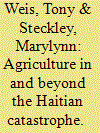

|
|
|
|
|
| Summary/Abstract |
Although the devastation from Haiti’s 2010 earthquake was concentrated in Port-au-Prince, it had deep agrarian roots. This paper situates Haiti’s urban poverty in the chronic exploitation of the country’s peasant classes as a basis for assessing the competing contemporary visions for agricultural development. We argue that the post-earthquake reconstruction has fortified a neoliberal development that is incompatible with the aspirations of the Haitian peasantry. Given the interrelated power of domestic elites and international donors, and the proliferation of disconnected development projects, we conclude that any prospect for pro-poor development hinges on the growth and collaboration of peasant movements.
|
|
|
|
|
|
|
|
|
|
|
|
|
|
|
|
| 2 |
ID:
157882
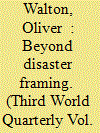

|
|
|
|
|
| Summary/Abstract |
This article examines how and why multi-mandate INGOs represent contemporary armed conflicts in particular ways. Based on empirical analysis of NGO communications and interviews with staff, it finds that these organisations typically adopt a two-track approach to representing conflicts. They use mainstream media to present consequence-oriented accounts to the general public, while utilising alternative channels to represent more nuanced depictions of conflict to more targeted audiences. These alternative forms of communication often aim to disrupt the dominant narratives of conflict produced by influential policy or media actors. Decisions about how to represent conflict are shaped by organisations’ histories, identities and funding relationships.
|
|
|
|
|
|
|
|
|
|
|
|
|
|
|
|
| 3 |
ID:
146635
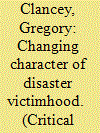

|
|
|
|
|
| Summary/Abstract |
Japan is periodically wracked by “Great Earthquakes” (daijishin) – seismic events so destructive that they leave massive amounts of textual and graphic evidence, much of it produced by people who did not experience the events directly. Using this cache of information, it is possible to see how the idea of the “disaster victim” has changed over time and circumstance. My paper traces this role across five Great Earthquakes that spanned roughly 150 years (1855–2011), a period convergent with modern Japan. I will argue that the sense of who and what has been victimized by the shaking of the earth – who has suffered, what weight to attach to their loss, what actions to take and emotions to feel regarding their situation – has changed regularly, and surprisingly, over this rather short period. There is, in other words, no common Japanese experience of victimhood, even in the context of one disaster type over a relatively short historical period. The article is one contribution to an as-yet unexamined history and comparative study of the modern role of disaster victim.
|
|
|
|
|
|
|
|
|
|
|
|
|
|
|
|
| 4 |
ID:
024561


|
|
|
|
|
| Publication |
New York, Ward lock educational, 1969.
|
| Description |
xvi, 354p.
|
| Standard Number |
0706233018
|
|
|
|
|
|
|
|
|
|
|
|
Copies: C:1/I:0,R:0,Q:0
Circulation
| Accession# | Call# | Current Location | Status | Policy | Location |
| 005009 | 302/BAR 005009 | Main | On Shelf | General | |
|
|
|
|
| 5 |
ID:
081035


|
|
|
|
|
| Publication |
Cambridge, Polity Press, 2008.
|
| Description |
viii, 293p.
|
| Standard Number |
9780745640198
|
|
|
|
|
|
|
|
|
|
|
|
Copies: C:1/I:0,R:0,Q:0
Circulation
| Accession# | Call# | Current Location | Status | Policy | Location |
| 053137 | 363.3498/KEE 053137 | Main | On Shelf | General | |
|
|
|
|
| 6 |
ID:
092855


|
|
|
|
|
| Publication |
2009.
|
| Summary/Abstract |
A comparison of two studies conducted ten years apart on energy accidents provides important insights into methodological issues and policy implications. Recommendations for further improvements in energy accident studies are developed including accounting for differences between average and incremental accident damages, testing for appropriate levels of aggregation of accidents, making references and databases publicly available, more precisely defining and reporting different types of economic damages, accounting for involuntary and voluntary risks, reporting normalized damages, raising broader public policy and planning implications and updating existing accident databases.
|
|
|
|
|
|
|
|
|
|
|
|
|
|
|
|
| 7 |
ID:
189246
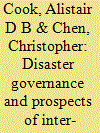

|
|
|
|
|
| Summary/Abstract |
The Southwest Pacific is considered one of the most vulnerable regions in the world to natural hazards. Five of the Pacific Island States (PIS) rank among the top 20 most-at risk countries in the World Risk Index, with Vanuatu and Tonga ranking first and second respectively. The Southwest Pacific neighbours Southeast Asia and both regions are exposed to a variety of natural hazards, resulting in significant damage and loss of lives annually. Similar exposure to climate-induced hazards raises the potential to create a coalition of affected states from the Asia-Pacific to share knowledge of disaster governance in areas where niche capabilities have been developed and shape the global debate on the effects of natural hazards and climate-induced disasters. This article argues that inter-regional partnership on disaster governance is the next step in the Asia-Pacific to respond to a collective action problem affecting two sub-regions - Southeast Asia and the Southwest Pacific. Through the conduct of desk research and interviews, this article first presents findings and observations on the disaster governance landscape and future developments in the Pacific. It then discusses disaster management frameworks and initiatives that ASEAN has institutionalised, and how work in the two sub-regions can complement one another and provide a platform to help shape the global agenda on disaster governance and climate change.
|
|
|
|
|
|
|
|
|
|
|
|
|
|
|
|
| 8 |
ID:
184190
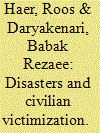

|
|
|
|
|
| Summary/Abstract |
How do natural disasters affect the treatment of civilians by non-state actors? On the one hand, conflict literature argues that adverse shocks influence the strategic interplay between rebel groups and the government, potentially increasing the level of violence against civilians. On the other hand, sociological research on natural disasters argues that they increase social integration and cooperation and are thus expected to reduce the risk of violent behaviour. In this study, we contend that the dynamics of violence against civilians are different in the short term and long term after a disaster strikes. We argue that natural disasters lead to a decrease in violence against civilians perpetrated by rebel groups in the short run. However, over time this temporary improvement in social integration starts to decline, increasing the level of civilian victimization. To examine this potential temporal dynamic, we combine georeferenced information on one-sided violence (Armed Conflict Location & Event Data; ACLED) and data on disasters (Emergency Event Database; EM-DAT). Our results confirm the expected dynamic effects. This research has important implications for our understanding of how disasters can influence the relationship between civilians, rebel groups, and governments.
|
|
|
|
|
|
|
|
|
|
|
|
|
|
|
|
| 9 |
ID:
184191


|
|
|
|
|
| Summary/Abstract |
How do disasters affect intergroup peace and conflict? Existing research shows that disasters can have opposing effects on how we perceive others: they can exacerbate existing tension in some cases or serve as catalysts for peace and cooperation in others. Yet we know little about the conditions under which we should expect one or the other. In this study, we estimate the impact of disasters on perceptions of out-groups. We combine a dataset of mass disasters with tens of thousands of individual-level survey responses recorded in Round 6 of the Afrobarometer data between 2014 and 2015. Using a difference-in-differences approach exploiting spatial and temporal proximity to disaster occurrences, we estimate the degree to which disasters affect public opinion toward out-groups. As disaster occurrence is plausibly exogenous to interview dates or respondent locations, our approach allows for an improved test of how the shock from disaster can impact public perceptions. Moreover, we show such impact varies by considering the differences in political salience of out-group identities and short- versus long-term differences in the impact on group dynamics. The implications of our findings for understanding the aftermath of past disasters and effects of future disasters on intergroup peace and conflict are discussed.
|
|
|
|
|
|
|
|
|
|
|
|
|
|
|
|
| 10 |
ID:
184188
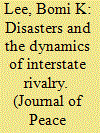

|
|
|
|
|
| Summary/Abstract |
This article examines how disasters influence conflict dynamics in interstate rivalries. Building on insights from the disaster, rivalry, and diversionary conflict literatures, the authors argue that disasters act as political shocks that disrupt a rivalry relationship. Hostility levels in rivalries are stable over time and shift only through major shocks. While the rivalry literature suggests that some shocks may lead to peace, the authors argue that disaster shocks are more likely to be associated with increased conflict. Disasters often strain the state’s capacity to provide security for its people, while leaders who fail to prepare or respond can face domestic costs. To avoid potential removal from office, leaders have incentives to divert the public’s attention away from poor disaster response by adopting a more aggressive foreign policy. The authors hypothesize that the time between militarized disputes is shortened when pairs of states experience rapid onset disasters. However, the conditions for diversionary conflict depend on the degree of intrastate turmoil and the number of interstate rivalries, with disaster diversionary conflict happening most frequently in rivalry dyads with significant internal strife and multiple rivalries. Duration model analyses from 1900 to 2010 provide strong support for the theory and highlight the limits of disaster diplomacy in rivalry contexts. Given the increased frequency and severity of disasters globally, the findings suggest that environmental shocks are likely to increase interstate hostilities in conflict-prone regions.
|
|
|
|
|
|
|
|
|
|
|
|
|
|
|
|
| 11 |
ID:
101768


|
|
|
|
|
| Publication |
2010.
|
| Summary/Abstract |
This article investigates the conflict that had been developing since the 1950s in Darfur and which in 2003 and 2004 burst into intense warfare. A 'complex-structuring of violence' standpoint explains the warfare. The argument is organised in two parts. The first section formulates the position by introducing Darfur, next evaluating the prevailing barbarisation perspective's attempts to explicate Darfur warring and, finally, formally presenting the complex structuring standpoint. The second section offers evidence bearing upon this standpoint. This involves information showing that four interrelated structural realms form a causal complex producing the violence. The article ends with discussion of the US government's role in Darfurian disasters of war.
|
|
|
|
|
|
|
|
|
|
|
|
|
|
|
|
| 12 |
ID:
094728
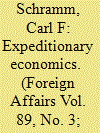

|
|
|
|
|
| Publication |
2010.
|
| Summary/Abstract |
NATO has traditionally treated Russia as a strategic pariah. But now, the West urgently needs Moscow's cooperation on a host of issues. A vision for turning Russia into a productive member of the Euro-Atlantic community is within reach: Russia should join NATO. Although NATO would run a strategic risk by admitting Russia, the Atlantic alliance is actually running a greater strategic risk by excluding it.
|
|
|
|
|
|
|
|
|
|
|
|
|
|
|
|
| 13 |
ID:
092234
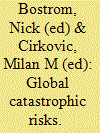

|
|
|
|
|
| Publication |
Oxford, Oxford University Press, 2008.
|
| Description |
xi, 554p.
|
| Standard Number |
9780198570509
|
|
|
|
|
|
|
|
|
|
|
|
Copies: C:1/I:0,R:0,Q:0
Circulation
| Accession# | Call# | Current Location | Status | Policy | Location |
| 054593 | 363.34/BOS 054593 | Main | On Shelf | General | |
|
|
|
|
| 14 |
ID:
173728
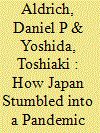

|
|
|
|
|
| Summary/Abstract |
While a number of nations have used high-tech surveillance, mass testing, contact tracing, and draconian stay-at-home laws to manage the ongoing pandemic, Japan’s official response has been less energetic. The country also faces tremendous challenges with an aging population, high population density, and broad use of public transportation systems. Yet it has managed to achieve strong COVID-19 outcomes, with far lower death rates than many other advanced industrial democracies. This article traces Japan's weak response and potential explanations for its pandemic miracle, focusing especially on the role of social ties and silver linings that have emerged during the pandemic.
|
|
|
|
|
|
|
|
|
|
|
|
|
|
|
|
| 15 |
ID:
149441
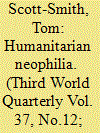

|
|
|
|
|
| Summary/Abstract |
This paper critically examines the ‘humanitarian innovation’ movement, arguing that it represents a departure from classical principles and the entry of a distinctive new ideology into the sector. Labelling this ‘humanitarian neophilia’, the paper argues that it has resonances of Barbrook and Cameron’s ‘Californian Ideology’, with its merging of New Left and New Right within the environs of Silicon Valley. Humanitarian neophilia, similarly, comes from a diverse ideological heritage, combining an optimistic faith in the possibilities of technology with a commitment to the power of markets. It both ‘understates the state’ and ‘overstates the object’, promoting a vision of self-reliant subjects rather than strong nation-states realising substantive socioeconomic rights.
|
|
|
|
|
|
|
|
|
|
|
|
|
|
|
|
| 16 |
ID:
148284
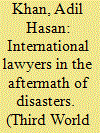

|
|
|
|
|
| Summary/Abstract |
In the present lives in the postcolony are beset by relentless disasters, generating great suffering and loss. How should an international lawyer conduct herself in response? Resisting the urge to construct these times as entirely unprecedented, this article attempts a response by drawing out the conduct of two ancestral Third World international lawyers responding to disasters in their own time. It reveals how disasters never simply occur but are actively produced by particular modes of conduct deployed by international lawyers. From their conduct we learn how to attend to the tasks of justice and responsibility in the aftermath of disaster by being responsive to the suffering and by recognising the disastrous effects of our action. We also learn how attending to the tasks of inheritance is vital for this.
|
|
|
|
|
|
|
|
|
|
|
|
|
|
|
|
| 17 |
ID:
157943
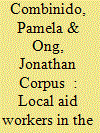

|
|
|
|
|
| Summary/Abstract |
This paper examines the experiences of Filipino workers recruited for technology and communications work by international aid agencies involved in the Typhoon Haiyan response. Filipino workers, many of whom were personally coping with the social and economic impact of this disaster, were hired on short-term contracts to test and implement various digital humanitarian innovations such as feedback and hazard mapping technological platforms. These workers were doubly marginalized: first, as tech workers whose work was viewed by aid officers on the ground as less substantial than that of food or shelter programs; and second, as local voices often drowned out by national and international colleagues. Moving beyond the usual figure of the cosmopolitan and adventure-seeking Western humanitarian acting on distant suffering, this paper draws attention to local aid workers’ aspirations for personal and professional mobility as they seize novel opportunities opened up by the digital humanitarian agenda. It outlines how the digital humanitarian project’s ambition to facilitate the inclusion of disaster-affected communities is fundamentally undermined by labor arrangements that doubly marginalize local aid workers.
|
|
|
|
|
|
|
|
|
|
|
|
|
|
|
|
| 18 |
ID:
185112
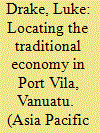

|
|
|
|
|
| Summary/Abstract |
Alternative economic indicators are becoming policy in Vanuatu, particularly focusing on what national policy calls traditional economy. Although this acknowledges livelihoods and customary land in rural areas, urban places receive less attention. This article advances an argument that cities are also home to traditional economies. We draw on concepts of diverse economies and translocality to examine how economic practices typically associated with community activities on customary land are also found in cities where households lack direct access to customary resources. Empirical data come from the authors' fieldwork and participation in community-based organisations in Port Vila, Vanuatu, from 2017 to 2020. The case study presents surveys of agrobiodiversity in 27 urban backyards and livelihood practices of 24 households; and accounts of co-authors' participation in community-based disaster to distribute disaster relief supplies from urban to rural, create urban markets for rural crops and build urban resilience following Ambae Island's Manaro volcano eruptions and COVID-19-related unemployment. This study demonstrates how traditional economies are part of everyday urban life.
|
|
|
|
|
|
|
|
|
|
|
|
|
|
|
|
| 19 |
ID:
168821
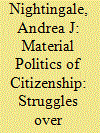

|
|
|
|
|
| Summary/Abstract |
Examining the boundaries of state–society–citizen–environment after the federal restructuring in Nepal, we ask how do people claim authority or citizenship rights? We theorise state power through the socio-environmental state framework as a set of socio-natural relations in the making, formed by struggles over authority, recognition and environment. Using qualitative data from Barpak, the epicentre of the 2015 earthquake, we capture the politics of natural resource governance that (re)emerged during earthquake reconstruction and local-level elections, illustrating how control over resources is negotiated, disputed, and inscribed in law (land titles and water sources) and landscapes (water sources, earthquake resettlement area, an open-air museum).
|
|
|
|
|
|
|
|
|
|
|
|
|
|
|
|
| 20 |
ID:
161947


|
|
|
|
|
|
|
|